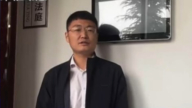【新唐人2012年9月11日讯】中国大陆的看守所经常爆出躲猫猫死、喝水死等不可思议的“奇异”死法,让社会各界跌破眼镜,惊叹黑幕重重。最近,大陆官方宣称,将要扩大全国在押人员投诉处理机制的试点范围,从而遏制酷刑。但这一举措并不被民众看好,被批是在作秀。也有专业人士指出,中国缺少的并不是法律法规,而是对法律的尊重和执行。
大陆《京华时报》报导,去年(2011年)3月开始试点的在押人员投诉处理机制,将在今年10月扩大到3个省份共4个地方,宁夏吴忠市、浙江宁波北崙区、安徽芜湖县和南陵县被纳入全国在押人员投诉处理机制二期项目。官方号称,在押人员将被鼓励投诉,外部公众、包括律师也可以介入监督。
对此,独立评论员邢天行向《新唐人》分析指出,中共的政法系统非常黑暗,近年来曝光出来的很多事实,尤其是劳教所、看守所里经常有在押人员离奇死亡,让大众对政法黑暗非常不满,很多人希望中共18大能够把政法委从政治局常委中去除。
独立评论员邢天行:“有一些敏感案件,律师根本就看不到在押的犯人。现在你搞这个(在押人员投诉处理)什么景啊,它(政法系统)就是为了买好嘛,好像他们在这个时期,在他还没有下去这个时期,他们继续在做一些改良。”
大陆律师张卉也指出,中国大陆并不缺少法律和规定。
大陆律师张卉:“中国缺的是对法律的尊重和对法律的执行,缺的是这个东西。我只能说,它在表面上是一个进步的举措,但是实际上会否带来一些实际的效果,这个我不敢下一个结论。”
张卉举例说,虽然中国有明确的法律条文,来规定嫌疑人的羁押时间,但看守所的超期羁押现象仍然很严重。
张卉:“第一, 主管机关这些人的权力意识非常强大。然后,民众的权益意识又非常的淡薄。所以就造成,当出现问题的时候,首先想到的不是找法律,而是找人。”
中国人民大学“诉讼制度与司法改革中心”副教授程雷曾到广东、浙江、河南等地看守所调研,结果发现,在押人员普遍不敢投诉、担心投诉有风险或者觉得投诉无用。一个市级看守所在押有几百人,一年只有10件左右投诉,非常不合常理。
《明慧网》报导,北京大法弟子刘桂芙,2001年2月被劫持到北京海淀区看守所。在那里,她被警察殴打得全身是伤、大便失禁、耳膜破裂、腹部膨胀得像孕妇一样。狱医还授意给刘桂芙服用不明药物。牢头误以为是助消化药物,偷吃了10片,结果很快就头晕眼黑、呼吸困难,急忙求医。不久后,刘桂芙被投入劳教所,遭受了被殴打体罚、不让睡觉、不让上厕所、不让吃饭喝水、灌食损害神经的不明药物等残酷折磨,但因为警察执法犯法,根本无处投诉。
北京大法弟子刘桂芙:“我找着宋丽丽(警察),宋丽丽说:他们的一切行为,包夹(犯人)的一切行为,都是我让他们干的。我说他们打人,宋丽丽说是她让干的。”
最近,在备受外界关注的“300手印”事件中,当事人河北泊头教师、法轮功学员王晓东就曾被警察电刑逼供整整一天,几千元钱被抢走。当局还强行辞退王晓东要聘请的律师,强行指定政府安排的律师。而王晓东的妹妹则仅仅因为向国际社会曝光王晓东案就遭到当局抓捕迫害,被判一年劳教。
采访/刘惠 编辑/李谦 后制/朱娣
‘Just for Show’: Authorities Expand Complaints Procedure for Detention Centre Detainees
Frequent incidents of mysterious deaths occur inside China’s
detention centers, revealing a darkness behind the scenes.
Recently Chinese officials declared that it would expand the
scope of the pilot complaint handling mechanism for detainees.
This was stated to help curb torture. But this initiative
is not appreciated, but rather, it was seen as simply a show.
Commentators point out that China is does not lack laws and
regulations, but rather the respect and implementation of them.
According to China’s Beijing Times, in March 2011, a pilot
program for a detainee complaint handling mechanism began.
It will be extended in October to four places:
Wuzhong City, Ningxia Province,
Beilun District of Ningbo, Zhejiang Province,
Wuhu County and Nanling County of Anhui Province.
This is the second phase of the project.
The official declaration states that detainees
are encouraged to file complaints.
External observers, including lawyers
can be involved in overseeing it.
Independent commentator Xing Tianhang spoke to NTD.
The Chinese Communist Party (CCP)’s
political and legal system is very dark and corrupt.
Many facts were exposed in recent years.
This includes incidents of mysterious deaths
at labor camps and detention centers.
The public is very dissatisfied with it.
Many hope the CCP 18th Congress will see
the removal of the Politics and Law Committee from the Politburo Standing Committee.
Xing Tianhang: “For some sensitive cases,
lawyers cannot even meet their clients in custody.
What’s the point of this initiative?
It is just a show by the political and law system, which
is trying to feign improvement before they are removed.”
Lawyer Zhang Hui in China also pointed out
that China does not lack laws and regulations.
Zhang Hui: “China’s lack of respect for the law
and law enforcement is what is missing.
On the surface, it is an initiative for improvement,
but I am not sure whether it will bring practical effects."
Zhang Hui said that although China has clear legal provisions
on custody times, extended detention is a very serious problem.
Zhang Hui: “First, the authorities are very powerful.
Secondly, people’s awareness of what is right is weak.
Where there are issues, people will go
through networking, rather than relying on law.”
Cheng Lei, associate professor of Renmin University’s China
Litigation System and Judicial Reform Center,
visited detention centers in Guangdong,
Zhejiang and Henan areas.
He found out in his research that detainees generally dare not
file complaints, fearing the risk or thinking it will be useless.
A municipal level detention center has hundreds of people,
with only about 10 complaints each year, which is unusual.
Minghui.net reported about a Beijing Falun Gong practitioner.
Liu Guifu was kidnapped and sent to the Beijing
Haidian District Detention Center in February 2001.
The police beat her, causing scars all over her body,
fecal incontinence, a ruptured eardrum, and swollen abdomen.
The prison doctor ordered Liu to be given unknown drugs.
Head prisoners mistakenly thought it was good for digestion.
She took 10 tablets and felt dizziness and breathing difficulties
soon afterwards, and hurried to seek medical attention.
Later, Liu was sent a labor camp. She was subjected
to beatings, torture and deprivation of sleep.
She was not allowed to use the toilet, nor eat and drink,
yet she was force-fed unidentified drugs that caused damage to her nervous system.
However, there is nowhere to file complaints.
The police committed the crimes, and they know the law.
Beijing Falun Gong practitioner Liu Guifu: “I found Song Lili (the police). She said,
‘I ordered them to do so. I ordered them to hit you.’”
During the recent “300 Fingerprints" petitioning events,
Wang Xiaodong, a Hebei Botou teacher and Falun Gong
practitioner, was tortured by police with electric shock batons.
The torture lasted a whole day, and thousands
of yuan were taken away from him.
The authorities also forced the dismissal of the
lawyer whom Wang Xiaodong planned to hire.
They arranged their own lawyer for him.
Wang Xiaodong’s sister was arrested and
sentenced to one year in a forced labor camp.
Her crime? Exposing Wang Xiaodong
treatment to the international community.

























